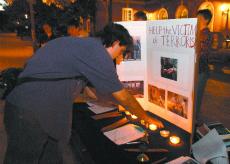Vigil held to inform on terrorism in Russia

Vladimir Calugaru, senior in engineering, places candles on a table outside of the Illini Union on Thursday. A vigil was held for the Russians who perished in the hostage situation last week. Online Poster
September 10, 2004
Since the Sept. 11, 2001, attacks, Russia has been attacked by terrorists more than any other nation, said Lara Mokhov-Alferova, president of the Russian Society and graduate student. That is why she arranged to have a candlelight vigil on the north side of the Quad on Thursday night.
The vigil began at 6:40 p.m. with a prayer service from an Orthodox priest. From 7 to 8 p.m., about 20 students and supporters stood with lit candles in remembrance of the students and teachers killed by Chechen terrorists at Beslan’s School No. 1, Russia.
“Our first main point is to get people more information about the things that are going on in Russia,” Mokhov-Alferova said. “Our second main point is to collect donations. Last time we held a fundraiser, we received about $600 in donations. There are survivors from this tragedy, and many are handicapped or orphaned and will need money.”
Father George Pyle of the Three Hierarchs Greek Orthodox Church said the prayer before the vigil. Pyle said that the vigil was for people of all religious traditions but he encouraged people to come to the church and donate to the school.
“All terror is evil, but when it is perpetrated against children, that’s just awful,” Pyle said. “This may be a small vigil, but although we are few, we are creating respect in the people who walk past.”
Get The Daily Illini in your inbox!
The Russian Society worked alongside the Russian Club to organize the vigil. Both groups ordinarily host social activities that emphasize their Russian roots and culture, but they are trying to reach out to help Russians now that it is necessary, said Vladimir Calugaru, president of the Russian Club and a senior in engineering.
“Usually the club is about socializing and getting to know other people with the same language and culture as you,” Calugaru said. “But now we are doing something that has become a little bit more necessary.”
Mokhov-Alferova said she hoped that students of all racial and ethnic backgrounds would attend the vigil, and that, in past experiences, she has seen more non-Russians than Russians at events like this.
“People usually see a need to help others, even if they are not Russian,” she said. “And there just aren’t a whole lot of Russian students on campus. I really hope that we can give people some new information that may not be in the mainstream and help them to broaden their horizons and learn more about the problems going on in Russia.”
Vladimir Medvedovsky, a graduate student, attended the vigil and said he hoped that it would help students look beyond just the campus.
“We really need to create awareness of what’s going on outside of our immediate local area,” he said. “Awareness can lead to knowledge and knowledge can reduce hatred.”
Mokhov-Alferova encouraged students and local residents to donate to the Russian Society, which would send its funds to the Russian Embassy, as well as an organization called Moscow Help that will send relief to the victims of the attacks.
For more information on these organizations,visit Moscowhelp.org or http://russianembassy.org.






